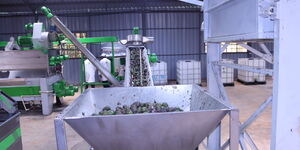Kenyans could have been exposed to yet another poisonous commodity after the Kenya Bureau of Standards (KEBS) flagged a 2-million-kilogram rice consignment.
Documents from KEBS, obtained by the press, revealed how the rice, which was declared unfit for human consumption, was diverted into the Kenyan market.
According to the standards bureau, the flagged consignment, imported from Pakistan in September and October of this year, was deemed unfit after failing the aflatoxin test.
The bureau stated that the test results showed the rice contained a higher percentage of aflatoxin than allowed, making it unfit for human consumption.
The report further disclosed that a consignment of 83,000 bags of 25kg rice was ferried from the Kilindini port in Mombasa to Nairobi, where it was repacked and redistributed to several wholesale and retail outlets.
When KEBS officials realised that the rice had entered the market despite failing to meet the required standards, they initiated a crackdown but only managed to seize 23,000 kg.
Market surveillance officers from KEBS confiscated the poisonous rice at the Central Business Park, located within Nairobi's industrial area.
It is not the first time that Kenyans have found themselves consuming poisonous or even substandard commodities. In an analogous situation, three months ago, 32 million litres of cooking oil was flagged by KEBS after it illegally found its way into the markets.
KEBS Managing Director Esther Ngari while appearing before parliamentarians on September 23 told the lawmakers that the edible oil got into the market without the permission of the agency.
Ngari said that out of the 73 containers of imported cooking oil, 43 containers containing the cooking oil were released to Kenyans despite failing to meet the requisite KEBS nutritional requirement.
Upon accessing the market, several companies that deal in the packaging of products purchased the cooking oil and sold it to retailers across the country.
"We tested several consignments and the results we received showed failure. As far as KEBS is concerned, their products were rejected and therefore the Kenya National Trade Corporation (KNTC) should have not sold them out," Ngari informed the legislators.












